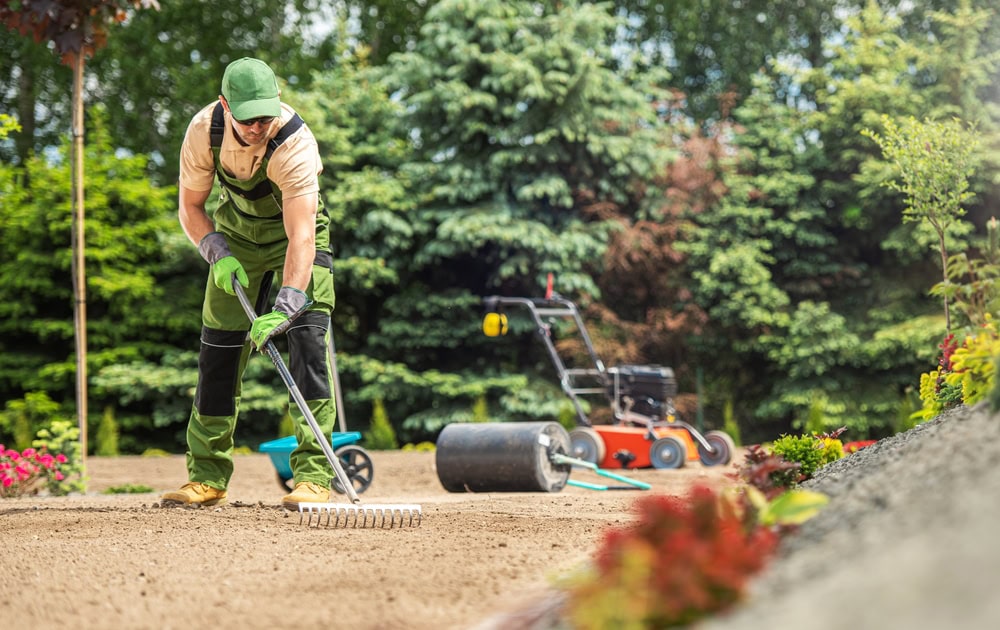All across the state, Californians get to enjoy extremely beautiful weather. To capitalize on this benefit, California homeowners tend to design their homes with a mix of indoor/outdoor spaces that maximize the exposure to pleasant weather.
This trend has been and will continue to be a fixture in the state, which means that general contractors can always expect their work to include exterior construction and at least some landscaping.
What Kind of License Is Needed For Landscaping?
In California, contractors need a C-27 license to provide specialized landscaping services. We won’t go too deeply into the C-27 license here – you can check out our post about the class C-27 Landscaping License to brush up on the type of work it covers and how to secure this license.
If you do not have a C-27 license, but you realize that your construction projects are going to veer into landscaping territory, alarm bells might be going off in your head. You need to complete your work, but you may also not be legally cleared to perform the work yourself. In this case, your only option is to hire licensed landscaping contractors to perform the work for you.
Where does general contractor work overlap with landscaping?
When it comes down to it, when does a general contractor need to hire a C-27 license holder to perform contracting work? When can a general contractor do the work themselves?
Here’s some of the most common interactions Class B and C-27 contractors have on builds.
- Landscape Integration
A lot of times, construction projects rely heavily on landscaping to enhance the overall aesthetic of a property — especially residential ones, where most general contractors operate. You’ve heard about how important “curb appeal” is to home buyers, especially nowadays. Creating a seamless integration of an outdoor space with a building’s design helps to sell the idea that a structure is safe and inviting to the onlooker. - Site Preparation
Before landscaping work can begin, sometimes there are site prep requirements that fall under the purview of a general contractor. This work can include grading, clearing, or creating a foundation for outdoor structures. - Hardscaping
Both general contractors and landscapers are involved with hardscaping. This work includes the construction of patios, pathways, retaining walls, or outdoor kitchens. This is a highly collaborative job, but the general contractor typically is responsible for the overall execution. - Irrigation and Lighting
When it comes to irrigation and lighting, C-27 license holders need to do the actual installation and design while general contractors build whatever infrastructure is needed for irrigation systems or outdoor lighting. - Project Management
On larger construction projects, a general contractor may be on the hook for crewing up and overseeing various subcontractors, including landscaping contractors. Understanding the demands of the landscaping labor and setting expectations for all parties involved would fall on the shoulders of the general contractor even though they’re not actually performing the landscaping duties.
Where Are General Contractor and Landscaping Duties Separate?
Despite the overlap in work responsibilities, it is important for general contractors to remain aware of the clear line between their work and the landscaping work. The licenses covering each serve distinct and unique purposes, each with specific responsibilities and requirements.
- General contractors are primarily responsible for overall construction.
The building’s structure, plumbing, electrical, and HVAC systems all fall to the general contractor. Their Class B license allows them to manage and coordinate various subcontractors, including C-27 license holders. The buck ultimately stops with them. - Landscaping contractors specialize in outdoor environments.
Working with the aesthetics and functionality of plants, trees, irrigation, and outdoor structures all fall to the landscaper. They work under the general contractor’s supervision and perform their duties in accordance with their orders.
Conclusion
General contractors and landscapers have overlapping responsibilities and concerns. Certain issues like noise and nuisance regulations, general construction labor and safety laws, and building codes and permits affect both types of workers in more or less the same ways.
However, there are state and federal regulations that shine a light on the areas where generalized contracting ends and where hyper-specialized landscaping begins.

